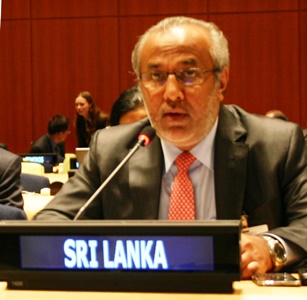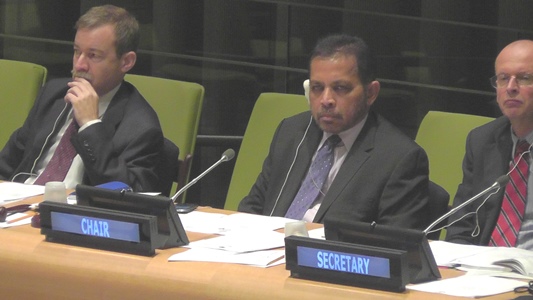

Statement made by
Hon. Rauff Hakeem,MP
Minister of Justice of the Democratic Socialist Republic of Sri Lanka
During the
Sixth Committee of the United Nations General Assembly 68th Session
On 09th October 2013, at the United Nations, New York.
Under Agenda item 85: "The Rule of Law at the National and International levels"
Mr. Chairman, Dr. Palitha Kohona,
At the outset I take this opportunity to congratulate you Mr. Chairman, on your election as Chairman of the sixty eighth session of the sixth committee and other members of your bureau. It is indeed a matter of pride for me personally to be here on this occasion to make the statement while you have been elected to this coveted chair. We have no doubt that under your able leadership; the deliberations during this session will be productive and useful.
Sri Lanka aligns itself with the statement made by Iran on behalf of the Non-Aligned Movement under this agenda item.
In a rapidly changing world, the rule of law, at national and international levels, provides a reassuring framework for our societies to consolidate the rights of human beings and develop and maintain peace, stability, good order and economic wellbeing. As human society progressed over the millennia from savage to sophisticated environment, it developed structures where the legal of framework was what ensured good order and predictability, both essential for economic advancement. Similarly, international society also evolved a concept of what is legal and what is illegal, although the tendency to interpret the law to ones owns narrow advantage is still a disturbing temptation at international level.
The rule of law is ingrained in the culture of all nations. It does not belong to any single part of humanity. Nor does any state or group of states have a monopoly in interpreting it. Our individual perceptions might differ when it comes to detail. But all societies have contributed to the evolution of the rule of law, from the laws of Manu, the laws of Hammurabhi, to the United States Constitution, the Universal Declaration of Human Rights and the International Covenant on Civil and Political Rights and the International Covenants on Social Cultural and Economic Rights. Concepts of what is right and just and what makes society function properly go back to very early times.
It is very important to remember and respect the diverse roots of the rule of law as we discuss it in the contemporary context. Grotius borrowed heavily from the practice of Indian Ocean States as he developed his “Mare Liberum” concept. Internationally, there have been long-standing efforts by States to create an international community based on the rule of law. The UN Charter, developed on the dying embers of the Second World War, is one of humanity’s seminal achievements. The General Assembly High-Level Meeting on “the Rule of Law at the National and International Levels” held last year was an important milestone in our efforts to develop a common understanding of the rule of law among Member States. The concept of sovereignty, noninterference in the internal affairs of states except in clearly specified circumstances that are in accord with commonly agreed rules, the non-use of force or the threat of force in international relations, are all incorporated into the Charter of the United Nations. Over the years, the international community also developed rules on human rights, the rights of women, the rights of children and the rights of the handicapped. Much more remains to be done.
Domestically, a strong adherence to the rule of law contributes to strengthening the institutional framework for the protection of the individual and his rights. The rule of law, has been a major contributing factor in advancing sustainable human development and the protection and empowerment of women, children and other vulnerable groups. The protection of minorities and the advancement of their rights are an essential part of this framework. The legal system of Sri Lanka, which provides the reassuring framework for our multi ethnic country, has evolved to accommodate the diverse cultural, ethnic and religious differences of our society. For example, each ethnic group in Sri Lanka is still governed by its own personal laws, resulting in a rich and varied web of personal laws enforced by the highest courts of the land. The provisions on fundamental rights in the Constitution of Sri Lanka are extremely comprehensive and the judiciary can be invoked by an aggrieved person even without the assistance of an attorney.
Sri Lanka has emerged from a 27 year long conflict with a terrorist group that remains proscribed in almost every democracy in the world and which challenged our treasured democratic institutions and legal framework. The terrorist challenge was first and foremost a challenge to our democracy and the rule of law. My country takes the view that an essential pre-requisite to strengthening the rule of law is the enhancement of the supporting institutional mechanisms. Countries emerging from decades of conflict, must be given the much needed time and space to engage in a restorative process. Ideas of the rule of law cannot be enforced from the outside or confirm to an external prescription that ignores domestic realities. Countries like Sri Lanka need support to strengthen their domestic institutions. Judgementative international interventions are counterproductive.
The codification of international law and legal obligations is an important aspect of the development of the rule of law at the international level. The office of Legal Affairs of the United Nations plays a central role in this regard. Today, there is hardly an area of human activity that is not regulated by treaty law. Over 530 multilateral treaties, covering almost every aspect of human interaction, are deposited with the Secretary-General. Easy access to this collection of treaties and domestic compliance with treaty obligations is an area where the UN can play a crucial and helpful role, particularly by assisting States with capacity building. The UN’s ability to encourage the teaching, study, dissemination and wider appreciation of international law will also contribute to the strengthening of the rule of law at the international level. The UN awards an annual scholarship in memory of an eminent Sri Lankan, Shirley Amarasinghe, who played a seminal role in the negotiation of the Law of the Sea Convention. We hope that this scholarship will continue to be adequately funded so that generations of developing country lawyers will benefit.
Increasingly, regional bodies have also begun to play an important role in addressing the growing problem of transnational organised crime and terrorism which threaten the international order. In particular, piracy, drug trafficking and human smuggling have become associated with terrorism and violent crime. International organized crime is now a major funding source of terrorism and is becoming a critical economic and social destabilizing factor. Long-term solutions to transnational organised crime, terrorism and piracy will need to focus on the delivery of basic services by justice and security institutions, not forgetting relevant economic and social factors. The simple approach of killing individuals, without addressing the key underlying factors will only create more willing volunteers for the terrorist cause.
Strengthening of the rule of law is essential, not just to maintain peace and good order as it is traditionally understood, but also to enable sustained economic progress and the achievement of the Millennium Development Goals. The rule of law must be treated as a cross cutting issue as we begin to develop the Sustainable Development Goals. While it is the traditional approach to refer to the rule of law in the context of individual rights, we should not forget its application to environmental protection, economic advancement and social order. In maintaining a balance between sustainable economic progress, and environmental sustainability, the rule of law can play an important role, both at national and international levels.
Thank You, Mr. Chairman.




